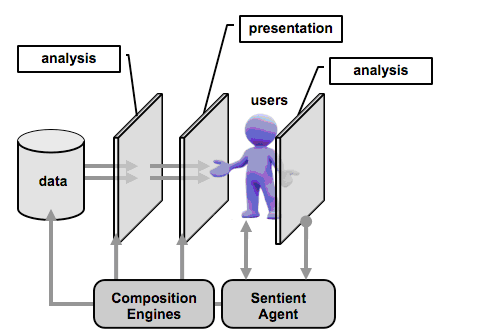Research Project
CEEDS: The collective experience of empathic data systems
Type
European Project
Start Date
01/09/2010
End Date
28/02/2015
Project Code
FP7-ICT-2009-5-258749

Staff
Project Description
The Collective Experience of Empathic Data Systems (CEEDS) consortium advances a novel integrated technology that supports the experiencing, analyzing and understanding of massive datasets. Key axiom of CEEDS is that discovery is the identification of patterns in complex data sets by the human brain. It is these implicit information processing capabilities that CEEDS seeks to exploit. The implicit cues, as measured through novel sensing systems, including bio-signals and non-verbal behaviour form the core information based on which the CEEDS system will process data and present them to the user(s). Confluence is achieve firstly, through immersion of the user in synthetic reality spaces, that allow to explore complex data spaces following narrative structures of varying spatio-temporal complexity, and secondly, through an unobtrusive multi-modal wearable technology that will provide an assessment of the behavioural, physiological and mental states of the user. The pattern detection faculties of individuals will be augmented by linking multiple users together, hence creating a collective discovery system. Overall integration is achieved by generalizing architectures from the field of network robotics, creating a novel technological approach towards massive distributed synthetic reality applications. The CEEDS paradigm will be validated through studies with stakeholders from science, history and design. On the theoretical level, CEEDS pursues a novel integrated computational and empirical framework, which merges the delivery of presence with the study of consciousness, its underlying sub-conscious factors and creativity. CEEDS will follow multi-disciplinary approach that will significantly further the state of the art across science, engineering and humanities, and advance the development of confluent technologies, by bringing together a team of leading experts in psychology, computer science, engineering, mathematics, and other key disciplines.
Project Publications
Conference Publications
-
P. Omedas, A. Betella, R. Zucca, Xerxes D. Arsiwalla, D. Pacheco, J. Wagner, F. Lingenfelser, E. Andre, D. Mazzei, A. Lanatá, D. de Rossi, A. Grau, A. Goldhoorn, E. Guerra, R. Alquézar Mancho, A. Sanfeliu and Paul F.M.J. Verschure. XIM-Engine: a software framework to support the development of interactive applications that uses conscious and unconscious reactions in immersive mix, 2014 Virtual Reality International Conference, 2014, Laval, France, pp. 26:1-4, ACM New York, NY, USA.
 Abstract
Abstract
 Info
Info
 PDF
PDF
-
A.A. Ortega and J. Andrade-Cetto. Segmentation of dynamic objects from laser data, 5th European Conference on Mobile Robots, 2011, Örebro, Sweden, pp. 115-121, Örebro Univ.
 Abstract
Abstract
 Info
Info
 PDF
PDF
-
E.H. Teniente and J. Andrade-Cetto. FaMSA: Fast multi-scan alignment with partially known correspondences, 5th European Conference on Mobile Robots, 2011, Örebro, Sweden, pp. 139-144, Örebro Univ.
 Abstract
Abstract
 Info
Info
 PDF
PDF
-
E.H. Teniente, R. Valencia and J. Andrade-Cetto. Dense outdoor 3D mapping and navigation with Pose SLAM, 2011 Workshop de Robótica Experimental, 2011, Seville, pp. 567-572.
 Abstract
Abstract
 Info
Info
 PDF
PDF
-
M. Villamizar, H. Grabner, J. Andrade-Cetto, A. Sanfeliu, L. Van Gool and F. Moreno-Noguer. Efficient 3D object detection using multiple pose-specific classifiers, 2011 British Machine Vision Conference, 2011, Dundee, UK, pp. 20.1-20.10.
 Abstract
Abstract
 Info
Info
 PDF
PDF
-
A. Garrell Zulueta, A. Corominas Murtra and A. Sanfeliu. Robot companions for guiding people in urban areas, 2011 Workshop de Robótica Experimental, 2011, Seville, pp. 419-426.
 Abstract
Abstract
 Info
Info
 PDF
PDF
-
M. Villamizar, F. Moreno-Noguer, J. Andrade-Cetto and A. Sanfeliu. Detection performance evaluation of boosted random Ferns, 5th Iberian Conference on Pattern Recognition and Image Analysis, 2011, Las Palmas de Gran Canaria, in Pattern Recognition and Image Analysis, Vol 6669 of Lecture Notes in Computer Science, pp. 67-75, 2011, Springer.
 Abstract
Abstract
 Info
Info
 PDF
PDF



Follow us!